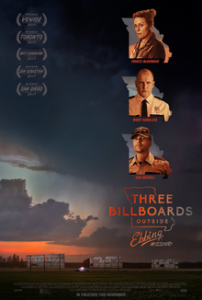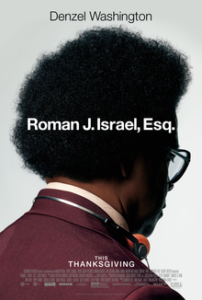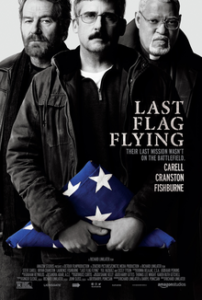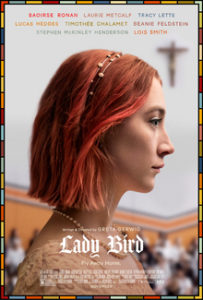Four auteured films.
No superheroes.
No space battles.
No remakes.
Let’s get it on.
Written and Directed by Martin McDonagh
Cast: Frances McDormand, Woody Harrelson, Sam Rockwell, John Hawkes, Peter Dinklage, Caleb Landry Jones, Kerry Condon, Darrell Britt-Gibson, Abbie Cornish, Lucas Hedges, Zeljko Ivanek, Amanda Warren, Malaya Rivera Drew, Sandy Martin, Christopher Berry, Jerry Winsett, Kathryn Newton, Samara Weaving, Clarke Peters, Nick Searcy
Soundtrack: Carter Burwell
Whether it was ever his intention or not, it’s completely fair to refer to Martin McDonagh as the British Isles’ answer to the Coen Brothers.
I mean, all three of his films (In Bruges, Seven Psycopaths, and now Three Billboards) have been crime-related dark comedies, all scored by Carter Burwell, and now he’s finally recruited Frances McDormand as his leading lady.
Not that I’m at all complaining, or throwing shade, or saying he’s ripping anyone off. He’s not. His stories are original, his characters are unique, and his films ultimately stick with you, Three Billboards most especially.
I rarely delve into plot, but I’m not spoiling anything by saying that the movie in a nutshell is about a mother’s search for justice for her slain daughter, in a rather messy and definitely confrontational way, weaving a tangled web involving everyone around her.
Three Billboards is fiery, brash, foul-mouthed, and not afraid to go to some dark places, yet somehow, in a very twisted, Martin McDonagh way, it has genuine heart and humanity, which is maybe the most surprising thing about it.
Of course, the movie would not be nearly as noteworthy without quality performances, which you get from almost everybody you need to get them from (I wouldn’t be surprised to see McDormand get some awards season buzz). The only one who threw me was Abbie Cornish, because I thought she had an American accent early on, but then at one point she slipped into an English accent and kept it for the rest of the movie; I’m still confused as to why.
All-in-all though, Three Billboards, not unexpectedly, is one of the best of the year.
Rating: ★★★★½ (out of five)
Written and Directed by Dan Gilroy
Cast: Denzel Washington, Colin Farrell, Carmen Ejogo, Lynda Gravatt, Amanda Warren, Hugo Armstrong, Sam Gilroy, Tony Plana, DeRon Horton, Amari Cheatom, Vince Cefalu, Nazneen Contractor, Robert Prescott, Shelley Hennig, Annie Sertich, Esperanza Spalding, Jessica Camacho, Ajgie Kirkland, Ludwig Manukian, Joseph David-Jones, Pej Vahdat, Henry G. Sanders, Miles Heizer
Soundtrack: James Newton Howard
Dan Gilroy’s directorial debut was Nightcrawler, which was one of the best films of 2014, and is still one of the best L.A. movies of recent vintage.
It’s a harsh standard to live up to, but Roman J. Israel, Esq. is no Nightcrawler.
Not that I’m going to compare and contrast them to death, because they are ultimately different, but they do both revolve around eccentric characters who come out of their shells a bit and take massive risks for the sake of sizable financial gain.
In the case of Nightcrawler, you’re glued to the screen from start to finish, and the third act in particular is unrelentingly thrilling.
Israel, on the other hand, is very muddled.
Denzel Washington’s performance in the titular role is compelling to watch, and is generally on par with any of the great performances of his career. The problem is that there’s not much else around him (Colin Farrell in particular feels a little directionless), and in the end I’m left wondering if the movie is trying to be profound and failing, or attempting to be meaningless as a statement, but it’s not clear to me either way, leaving me feeling just a bit empty.
If you’re a huge Denzel fan, Roman J. Israel, Esq. is maybe worth a rental down the road, but that’s about it.
Rating: ★★½ (out of five)
Directed by Richard Linklater
Written by Richard Linklater & Darryl Ponicsan, based on his novel of the same name
Cast: Steve Carell, Bryan Cranston, Laurence Fishburne, J. Quinton Johnson, Deanna Reed-Foster, Yul Vazquez, Cicely Tyson
Soundtrack: Graham Reynolds
To be perfectly honest, I don’t have a particularly high opinion of Richard Linklater as a filmmaker, but I was willing to put that aside for a movie that appears to have a great cast, and a story that serves as a spiritual sequel to 1973’s The Last Detail (which is also based on a Darryl Ponicsan novel and is a movie I would recommend).
Linklater admittedly specializes in films where not a whole lot actually happens, and sometimes such movies can work really well, but Last Flag Flying is not one of them.
In terms of the core (Corps?) performances, Steve Carell is great, Laurence Fishburne is fine, and Bryan Cranston is sub-par.
I know that’s a heretical statement, because he’s everyone’s favorite actor because Breaking Bad is the greatest (he’s one of mine, too), but Bryan Cranston is not beyond a turkey of a performance from time to time; I’ve seen it happen before. And I don’t necessarily blame him, because if this is the performance he brought or the performance he was directed to, and nobody told him it wasn’t great, that’s not his fault.
Anyway, it’s not like he’s the only problem.
The movie overall (especially in the dialogue) feels like a college film (not to mention its an early 2000s period piece that sometimes cares about the details and sometimes doesn’t care at all). Whether Linklater or Ponicsan is more at fault for the lackluster script, I don’t know, but since this was Linklater’s baby, I’m going to leave the blame on his doorstep.
To put it the most simply, this is a movie that needs to feel real and just doesn’t. The most egregious example is the mildly antagonistic Marine colonel, who is made-up and lit to look like a pale vampire, as if it’s not already painfully obvious that we are supposed to dislike him.
Maybe I’m wrong. Maybe Last Flag Flying perfectly portrays the dynamic of three old military buddies getting together after forty years, but it mostly just strikes me as off-base.
Definitely check out The Last Detail though, if you’ve not already seen it.
Rating: ★★☆☆☆
Written and Directed by Greta Gerwig
Cast: Saoirse Ronan, Laurie Metcalf, Tracy Letts, Lucas Hedges, Timothée Chalamet, Beanie Feldstein, Stephen Henderson, Lois Smith, Odeya Rush, Kathryn Newton, Jake McDorman, Bayne Gibby, Laura Marano, Andy Buckley, Jordan Rodrigues, Kristen Cloke, Daniel Zovatto, Bob Stephenson, Marielle Scott, Myra Turley, Richard Jin, Ithamar Enriquez, Carla Valentine
Soundtrack: Jon Brion
Talk about a surprise.
I really only saw this movie because I needed to kill time before something else, so perhaps it benefits from my complete lack of expectation, but I am honestly at a loss to find much fault with Lady Bird.
I don’t know too much about Greta Gerwig, other than she appears in movies I don’t see because I have no interest in them, but she really knocked it out of the park with this one. If the “teen girl coming-of-age” sub-genre hasn’t been done to death by now, it’s definitely in a stale place, and yet everything about Lady Bird feels fresh (and it’s an early 2000s period piece that actually cares the whole time, unlike certain other movies).
One of the major reasons why the film works so well is that it’s short, sweet, and to the point, because it covers pretty much a whole year in our main character’s life in ninety minutes, paradoxically using the whole cow and trimming all the fat at the same time.
It’s a fairly familiar story: Senior-itis, young love, teen rebellion, trying to be cool, applying to colleges, etc., but everything feels pretty spot on and earnest, unlike other similar movies where characters often feel like caricatures more so than real people.
Much like Three Billboards (if not to a larger extent), everyone who needs to turn in a quality performance in Lady Bird does so (Tracy Letts in particular stuck out to me in his supporting role as the dad). Saoirse Ronan is the star, to be sure, but this is ensemble casting at its finest.
It might not be quite appropriate for actual teenagers (and, given that it takes place in a time before they were born, I don’t know that they’d get out of it what a thirty-something audience would), but it definitely belongs in the pantheon of the genre, and it’s for sure one of the best movies I’ve seen this year.
Surprisingly.
Rating: ★★★★½ (out of five)





